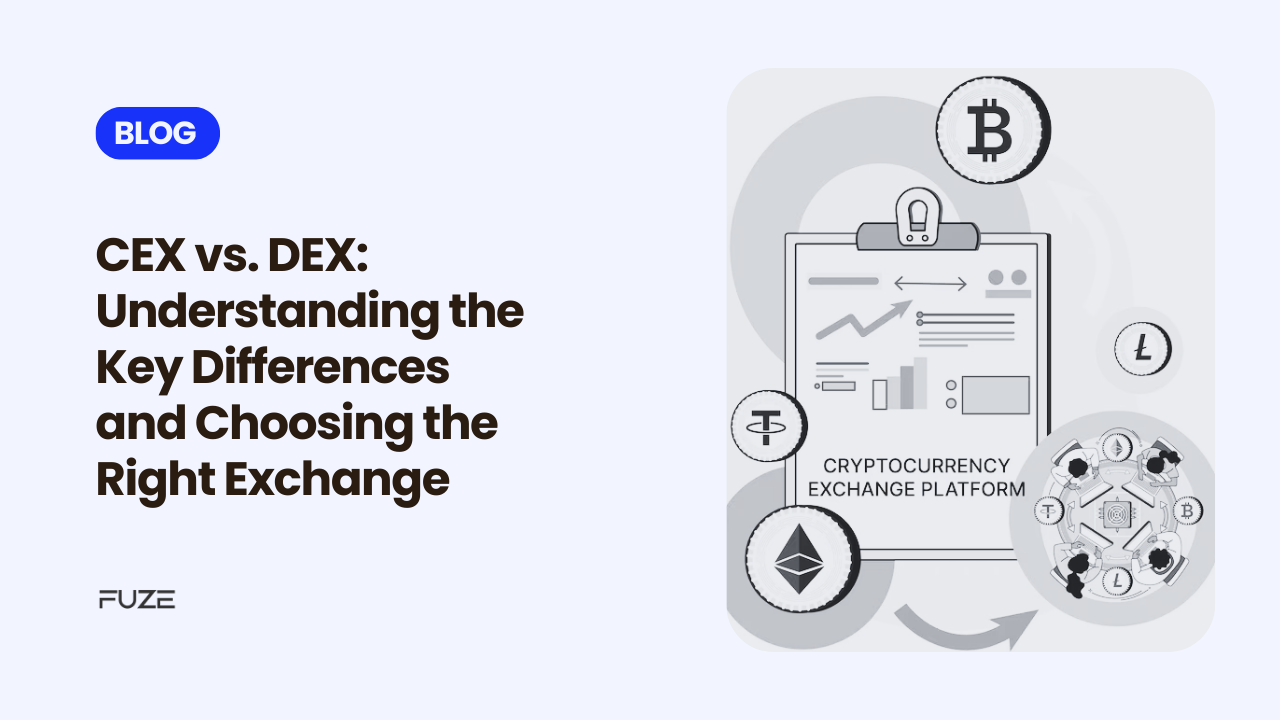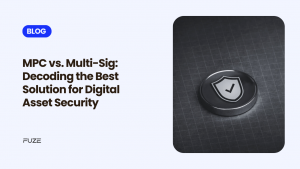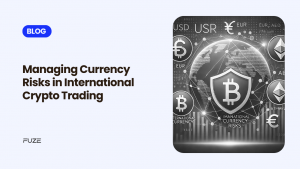The cryptocurrency trading landscape has grown tremendously over the last ten years, with exchanges being crucial for individuals and institutions looking to buy, sell, and trade digital assets. Generally, cryptocurrency exchanges fall into two main categories: Centralised Exchanges (CEX) and Decentralised Exchanges (DEX). Each type has its own set of benefits and drawbacks, which can vary based on the users’ needs and preferences.
This blog explores the key differences between Centralised (CEX) and Decentralised Exchanges (DEX), helping you choose the best platform for secure and efficient crypto trading.
What is a Centralised Exchange (CEX)?
A Centralised Exchange (CEX) is a platform run by a central authority or organisation. These exchanges serve as intermediaries for buyers and sellers, offering a variety of services such as order matching, trade execution, and fund custody.
The core characteristic of a CEX is its custodial control over the assets on its platform. Users deposit their cryptocurrencies or fiat currencies into the exchange, which manages those assets on behalf of users. This makes the exchange responsible for security, user authentication, and safe fund storage.
Key Features of Centralised Exchanges:
- Custodial Services: The exchange holds users’ funds, taking on the responsibility of managing and securing digital assets.
- User-Friendliness: CEX platforms usually feature intuitive interfaces, making them easy to navigate for both beginners and seasoned traders.
- Liquidity: Centralised exchanges generally provide higher liquidity, thanks to their large user base and deep order books, leading to tighter spreads and quicker transaction execution.
- Speed: Transactions on centralised exchanges are often quicker due to their centralised systems, allowing for rapid order matching.
- Fiat Integration: Many centralised exchanges enable direct deposits and withdrawals of fiat currencies, broadening their accessibility to a larger audience.
What is a Decentralised Exchange (DEX)?
A Decentralised Exchange (DEX) functions on blockchain networks, enabling users to trade directly with one another (peer-to-peer) without needing a central authority. Since DEXs operate independently of centralised entities, they provide a high level of transparency, with transactions carried out directly on the blockchain. They are frequently viewed as a more privacy-oriented choice for users who value financial independence and decentralisation.
Key Features of Decentralised Exchanges:
- Non-Custodial: Users have complete control over their funds, which minimises the risks of hacking or theft that are often associated with centralised exchanges.
- Privacy: DEXs typically do not require users to undergo Know-Your-Customer (KYC) processes, providing enhanced privacy and anonymity.
- Decentralisation: DEXs function without a central authority, aligning with the broader principle of decentralisation in the cryptocurrency ecosystem.
- Liquidity Pools: Many DEXs utilise liquidity pools instead of traditional order books to facilitate trades. Users can contribute liquidity to earn fees, and trades are executed based on the available liquidity.
- Smart Contracts: DEXs rely on smart contracts, which are self-executing agreements that operate on the blockchain, ensuring both transparency and immutability.
Key Differences Between CEX and DEX
1. Custody of Funds
CEX: Centralised exchanges take custody of your funds, meaning you deposit your assets directly into the exchange’s wallet. While this simplifies trading, it also carries the risk of theft if the exchange is compromised. However, reputable exchanges often implement advanced security measures like cold storage and insurance funds.
DEX: In decentralised exchanges, you maintain control over your funds. Transactions are conducted directly from your personal wallet, eliminating the risk of losing funds due to an exchange breach. However, you are responsible for managing your own private keys, and losing them could lead to permanent loss of access to your assets.
2. Liquidity
CEX: Centralised exchanges typically enjoy higher liquidity due to a large user base and substantial order book depth. This results in quicker trades with tighter spreads and better price execution, making CEXs a favourable option for larger trades.
DEX: Liquidity on decentralised exchanges can fluctuate based on the popularity of the asset being traded and the available liquidity pools. DEXs generally provide lower liquidity compared to CEXs, but participating in or providing liquidity to AMMs can enhance liquidity.
3. Speed and Transaction Fees
CEX: Centralised exchanges usually offer faster trade execution since they are centralised platforms with their own matching engines. Transaction fees on CEXs are often a fixed percentage or fee per trade, which may vary based on the platform and trade volume.
DEX: Although decentralised exchanges are more distributed, the speed of transactions is influenced by the congestion of the blockchain network. For instance, Ethereum-based DEXs may face delays during peak traffic times. Additionally, transaction fees on DEXs can vary, and high network congestion may lead to increased gas fees, particularly on Ethereum.
4. Security
CEX: Centralised exchanges, while convenient, have been more prone to cyberattacks historically. Notable hacking events, like the Mt. Gox incident, have underscored the dangers of relying on a third party for asset management. Nevertheless, many CEXs have improved their security measures, incorporating multi-factor authentication (MFA) and insurance to safeguard user funds.
DEX: Decentralised exchanges are often viewed as more secure regarding custody since users maintain control over their private keys. However, DEXs can still be vulnerable to issues within smart contracts, which hackers may exploit. It’s crucial for users to engage with trustworthy DEX platforms and smart contracts.
5. User Experience
CEX: Centralised exchanges usually provide a more user-friendly experience, featuring intuitive interfaces, customer support, and educational materials. They are ideal for beginners and those seeking a more conventional trading approach.
DEX: Although decentralised exchanges offer greater privacy and control, their user experience can be more complicated, particularly for newcomers. DEXs often require users to work with wallets, manage private keys, and grasp the intricacies of liquidity pools and smart contracts.
Choosing the Right Exchange: CEX or DEX?
Deciding between a CEX and a DEX comes down to various factors, such as risk tolerance, trading volume, and security needs. Here are some points to consider when selecting the right platform:
- For Beginners and Convenience: Centralised exchanges are perfect for newcomers or those who value user-friendliness and quick access to a diverse range of digital assets. If you want simplicity, customer support, and integrated fiat options, a CEX is probably your best bet.
- For Privacy and Control: If maintaining privacy, decentralisation, and control over your funds is crucial, then a DEX is the better option. DEXs enable users to trade directly without intermediaries, ensuring full ownership of their digital assets.
- For High Liquidity and Fast Execution: For larger trades or institutional investors, CEXs provide superior liquidity, quicker execution, and a wider selection of trading pairs. If you need to make trades swiftly and at competitive prices, a CEX might be more appropriate.
- For Lower Fees and No Intermediaries: If your goal is to minimise fees and steer clear of intermediaries, DEXs offer a peer-to-peer trading experience with lower transaction costs. Just remember that gas fees on blockchain networks can vary and sometimes rise.
Conclusion
Both Centralised Exchanges (CEX) and Decentralised Exchanges (DEX) offer distinct advantages depending on your needs. CEXs offer high liquidity, fast execution, and a user-friendly experience, making them ideal for those who prioritise convenience and speed. On the other hand, DEXs provide greater privacy, control over funds, and decentralisation, making them more appealing to those who prioritise security and autonomy.
As the cryptocurrency space continues to evolve, choosing the right exchange will depend on the balance of convenience, privacy, liquidity, and security that aligns with your trading strategy and risk profile. Whether you opt for a CEX or a DEX, it’s important to stay informed about the latest developments in the space and choose a platform that best fits your specific needs.
Disclaimer: Virtual assets carry significant risks, including high volatility and potential loss of your entire investment. They are not backed by governmental protections, and recourse may be limited in case of loss. Always assess your risk tolerance, fully understand the risks, and seek independent financial advice if needed before investing.
Frequently Asked Questions
- Do CEXs support more trading features than DEXs?
Yes, CEXs typically offer advanced trading features such as margin trading, futures, and stop-loss orders. DEXs focus on direct swaps and simple trading mechanisms. - Why are DEXs more private than CEXs?
DEXs do not require users to provide personal information or undergo KYC, ensuring greater privacy. CEXs, due to regulatory compliance, require user identity verification. - Which is better for beginners: CEX or DEX?
CEXs are generally more user-friendly for beginners, offering intuitive interfaces and customer support. DEXs can be challenging for newcomers due to technical complexities. - What are the liquidity differences between CEXs and DEXs?
CEXs often have higher liquidity, enabling faster and larger trades without significant price impact. DEXs rely on liquidity pools, which may have lower liquidity for some tokens. - How do I choose between a CEX and a DEX?
Choose a CEX if you prioritise ease of use, advanced trading tools, and regulatory compliance. Opt for a DEX if you value privacy, control over funds, and decentralized governance.







